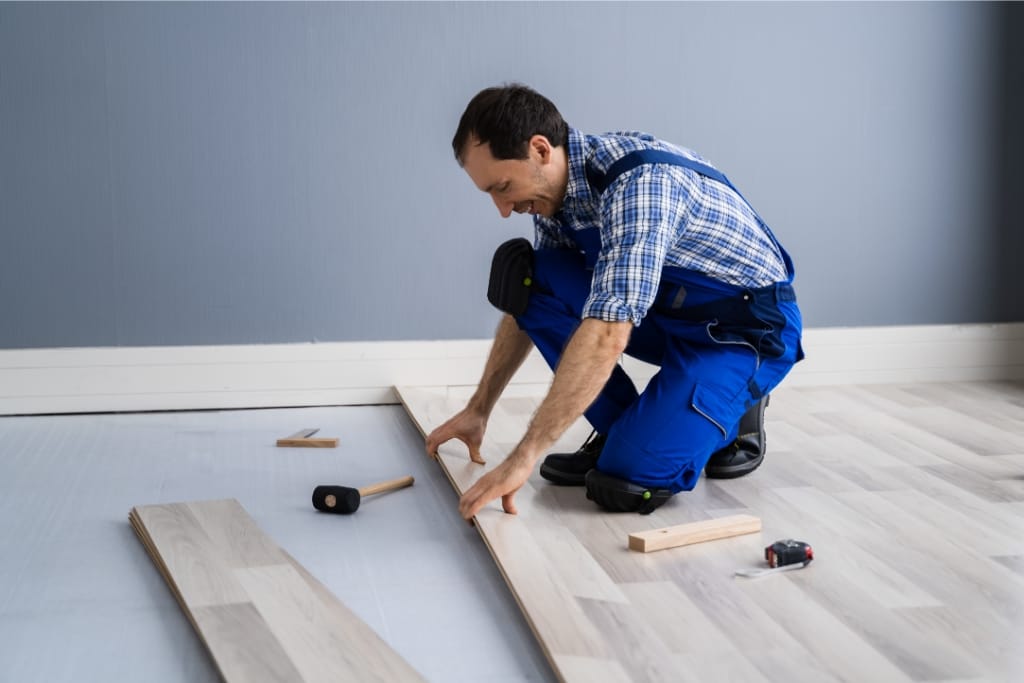Selecting the ideal flooring contractor is crucial for transforming your space with the desired elegance and functionality.
Whether it's a cozy home renovation or crafting the interiors of a new abode, the finesse with which your flooring is installed profoundly influences your environment's aesthetics and vibe.
Navigating through a sea of available contractors can seem daunting. Fortunately, we're here to streamline your search.
Equipped with these 10 insightful tips, you'll be well on your way to choosing a flooring contractor who not only meets your expectations but exceeds them, ensuring a seamless blend of quality, reliability, and style.
1)) Ask For Recommendations
One of the best ways to find a reliable flooring contractor is by asking friends, family, or neighbors for recommendations.
They can provide firsthand experiences and insights into the quality of work and customer service provided by different contractors.
Tips for Asking for Recommendations:
- Start with Your Network: Begin by reaching out to friends, family, and neighbors who recently had flooring work done. Their experiences can provide valuable insights.
- Utilize Social Media: Post a query in local community groups or on platforms like Facebook and LinkedIn. It's a quick way to gather recommendations from a broader audience.
- Check Online Reviews: While personal recommendations are invaluable, online reviews on platforms like Yelp, Google, and specialized home improvement sites can offer additional perspectives.
- Attend Home Shows: Home improvement and renovation shows are great places to meet contractors and gather recommendations from industry professionals and past customers.
- Ask for Before-and-After Photos: When someone recommends a contractor, ask to see before-and-after photos of the contractor's work to gauge their quality and style compatibility with your project.
Leveraging your network and researching through both digital and real-world platforms can significantly ease the process of finding a reputable flooring contractor.
By asking for recommendations, you tap into the collective experience of your community, gaining access to trusted professionals who have already proven their ability to deliver quality work.
This not only helps streamline your search but also sets a solid foundation for achieving the desired outcomes for your flooring project.
2)) Research Online
Take advantage of online resources such as review websites, social media platforms, and company websites to research potential flooring contractors.
Look for testimonials from previous clients, photos of completed projects, and any certifications or awards that may indicate their expertise.
Tips for Researching Flooring Contractors Online:
- Visit Official Websites: Start by exploring the contractors' official websites. Look for detailed information on services offered, project galleries, and customer testimonials.
- Read Online Reviews: Websites like Yelp, Google, and Angie's List are excellent for reading reviews. Pay attention to both positive and negative feedback to get a balanced view.
- Check Social Media Profiles: Many contractors use social media to showcase their work. Platforms like Instagram and Facebook can provide insights into their recent projects and customer interactions.
- Look for Certifications and Awards: Certifications, accreditations, and awards on a contractor’s website can indicate their expertise and commitment to quality.
- Engage in Online Forums: Join forums related to home renovation and construction. Asking questions and reading discussions can lead to valuable contractor recommendations.
- Compare Portfolios: Most contractors post their portfolios online. Compare these carefully to understand their proficiency in handling projects similar to yours.
- Check for Complaints: Research potential contractors on consumer protection sites to ensure there are no significant unresolved complaints against them.
In the digital age, leveraging online tools and resources for contractor research is not only convenient but essential for making an informed decision.
Delving into official websites, scrutinizing online reviews, and exploring social media profiles offer a comprehensive view of a contractor’s capabilities and reliability.
This thorough approach ensures you are well-equipped with the knowledge needed to select a contractor who aligns with your project’s requirements and aesthetic vision, laying the groundwork for a successful and satisfying flooring installation.
3)) Check Credentials
Before hiring a flooring contractor, make sure they are properly licensed, insured, and bonded.
This will protect you in case of any accidents or damages during the installation process.
Tips for Checking a Contractor's Credentials:
- Verify Licenses: Ensure the contractor has a valid license appropriate for flooring installation in your state. This can usually be done through your state’s professional licensing website.
- Ask About Insurance: A reputable contractor should have both liability insurance and worker’s compensation. Request to see proof to ensure you're protected against damage or injury.
- Inquire About Bonding: Bonding protects you in case the contractor fails to complete the job or meets other financial obligations, such as paying for permits or covering damages.
- Check for Industry Certifications: While not always mandatory, certifications from recognized industry organizations can indicate a higher level of expertise and professionalism.
- Review Their Standing with the BBB: The Better Business Bureau (BBB) provides information about the contractor’s business practices and any complaints filed against them.
- Ask for References: Request a list of recent clients you can contact directly. Speaking to past clients can provide insights into the contractor’s reliability and quality of work.
- Research Any Legal Issues: A quick online search can reveal if the contractor has been involved in any legal disputes related to their work. This could be a red flag indicating potential problems.
Ensuring that a flooring contractor is fully credentialed is a crucial step in the hiring process.
By verifying licenses, insurance, and bonding, you not only safeguard your project against potential legal and financial pitfalls but also gain peace of mind.
Checking for professional certifications and standing with the BBB further assures you of the contractor's commitment to quality and reliability.
This diligence in vetting credentials paves the way for professional and satisfactory project completion, laying a solid foundation for your flooring needs.
4)) Request Estimates
Contact multiple flooring contractors to request estimates for your project.
Compare pricing, timelines, and materials used to determine which contractor offers the best value for your money.
Tips for Requesting Estimates from Flooring Contractors:
- Gather Multiple Estimates: Aim to get estimates from at least three contractors to ensure you have a range of options to compare.
- Request Detailed Breakdowns: Ask for an itemized estimate from each contractor. This should include the cost of materials, labor, and any additional fees, which will help you understand where your money is going.
- Check for Hidden Costs: Ensure the estimate includes any potential extra costs, such as removal of old flooring, preparation of the subfloor, and disposal fees.
- Clarify Warranty Coverage: Understand what is covered under warranty for both materials and labor. This can significantly affect long-term satisfaction and costs.
- Assess Quality of Materials: Compare the quality of materials proposed by different contractors. Cheaper estimates may use lower-quality materials, affecting durability and appearance.
- Consider Timelines: Evaluate each contractor's proposed timeline for completion. A quicker timeline might be more convenient but could also indicate rushed work.
- Negotiate: Don't be afraid to negotiate prices or terms once you have all the estimates. Contractors may be willing to match lower bids or offer discounts for immediate booking.
- Read Reviews: Revisit reviews focusing on aspects like adherence to budget and timelines, which can provide insight into the accuracy and reliability of estimates.
- Ask About Payment Terms: Understand each contractor's payment schedule. Avoid those who demand full payment upfront, as this is not standard industry practice.
Successfully navigating the process of requesting estimates requires a balance of thorough research and strategic questioning.
By gathering multiple detailed estimates, you gain leverage to negotiate the best possible deal without compromising on the quality of materials or the expertise of the workforce.
Understanding the nuances hidden within each estimate, from warranties to timelines, enables a well-informed decision that aligns with both your budget and your vision for the project.
This diligent approach to evaluating estimates not only helps in selecting the right contractor but also sets a transparent and communicative foundation for the entire flooring installation venture.
5)) Visit Showrooms
If possible, visit showrooms or galleries showcasing different types of flooring materials to get a better sense of what you want for your space.
Some contractors may have their own showrooms where you can see samples in person.
Tips for Visiting Flooring Showrooms:
- Prepare a List of Questions: Before visiting, write down any questions you have about materials, maintenance, or installation processes to ensure you don't forget to ask while you're there.
- Take Pictures of Your Space: Bringing photos of the areas where the flooring will be installed can help showroom staff recommend materials that match your home's style and lighting.
- Bring Samples Home: If possible, take home samples of flooring options. Observing these samples in your own space can drastically affect your decision, as colors and textures may look different under your home's lighting.
- Wear Comfortable Shoes: Expect to spend a good amount of time on your feet. Wearing comfortable shoes can make the experience more pleasant as you walk across different flooring types.
- Take Notes and Photos: While visiting, take notes and pictures of your favorite options. This can help you remember which materials you liked best when reviewing your choices later.
- Consider Maintenance Requirements: Ask about the maintenance and durability of each flooring type, especially if you have pets, children, or a high-traffic area.
- Check for Special Offers or Discounts: Sometimes, showrooms offer discounts for orders placed during your visit or for specific materials. Don't hesitate to inquire about any ongoing promotions.
- Notice How the Floor Feels: Pay attention to how the flooring feels underfoot. Comfort and noise absorption are important factors, especially for living areas and bedrooms.
- Schedule an Appointment: If possible, schedule an appointment with a consultant who can give you their undivided attention and tailor recommendations to your specific needs.
Visiting flooring showrooms is a crucial step in the selection process, providing invaluable insights into the aesthetic and practical aspects of various flooring materials.
By preparing questions, taking pictures, and bringing samples home, you can better visualize how different options will integrate into your living spaces.
Not only does this hands-on approach facilitate a more informed decision, but it also enhances collaboration with professionals, ensuring that your final choice reflects both your style and functional requirements.
Engaging directly with the tactile and visual elements of potential materials, armed with knowledge and personalized advice, lays the groundwork for a choice that you will be satisfied with for years to come.
6)) Communication Is Key
When meeting with potential flooring contractors, pay attention to how they communicate with you.
A good contractor should be able to listen to your ideas, answer all your questions, and provide clear explanations about the installation process.
Tips for Effective Communication with Flooring Contractors:
- Be Clear About Your Vision: Start by clearly outlining what you want in terms of flooring type, appearance, and feel. The more specific you are, the better a contractor can meet your expectations.
- Ask for Clarification When Needed: Don't hesitate to ask questions if you don't understand technical terms or processes. It's important that you fully grasp what your project entails.
- Communicate Your Budget Upfront: Discuss your budget early in the conversation to ensure that recommendations are financially feasible for you.
- Provide Examples: Sharing pictures or samples of flooring you like can help the contractor understand your aesthetic preferences better.
- Request Regular Updates: Ask the contractor how they plan to communicate progress and updates. Regular check-ins can help keep the project on track and allow for adjustments as needed.
- Use Written Communications for Important Details: For confirmation of key decisions, changes, or agreements, use email or texts. This can provide a clear record of what has been discussed or decided.
- Be Open to Suggestions: Contractors may have valuable insights or alternatives that could better meet your needs or save you money. Be open to considering their professional advice.
- Establish a Timeline: Discuss and agree on a realistic timeline for your project. Knowing critical milestones helps manage expectations on both sides.
- Express Concerns Promptly: If something doesn't meet your expectations, communicate this as soon as possible. Addressing issues early can prevent bigger problems down the line.
- Acknowledge Good Work: Positive feedback is important. If you're happy with the work at any stage, letting the contractor know can contribute to a positive working relationship.
Maintaining open and effective lines of communication with your flooring contractor is essential for ensuring a successful flooring project.
By clearly expressing your desires, asking for clarifications, and being open to professional suggestions, you set the stage for a collaborative and fruitful partnership.
Ensuring that all important information is communicated in writing provides a solid foundation for mutual understanding and accountability.
By following these guidelines, you can actively participate in the process, resulting in a final product that aligns with your vision and exceeds your expectations.
The key to a satisfactory flooring installation lies not just in the quality of materials or the craftsmanship, but in the quality of communication between homeowner and contractor.
7)) Check References
Ask potential contractors for references from previous clients and follow up with them to inquire about their experience working with the contractor.
This will give you valuable insights into their professionalism and reliability.
Tips for Checking References of Flooring Contractors:
- Request Multiple References: Ask for a variety of references, including recent jobs and those that are several years old. This can give you a better understanding of the contractor's consistency over time.
- Prepare Your Questions in Advance: Make a list of questions to ask the references. Inquire about the contractor's punctuality, quality of work, communication skills, and whether they stayed within budget and timeline.
- Look for Similar Projects: Request references for projects that are similar in scope and style to yours. This can give you insight into how well the contractor can handle your specific needs.
- Listen for Red Flags: Be attentive to any hesitations or vague responses when discussing the contractor's work. This can be an indication of potential issues.
- Ask About Their Working Relationship: Find out how the contractor interacts with clients and whether they are open and responsive to communication.
- Inquire About the After-Service: Ask if the contractor was willing to address any concerns or issues that arose after the job was completed. It’s important to know if they stand behind their work.
- Seek Out Online Reviews: In addition to personal references, look for online reviews on trusted platforms to get a broader sense of the contractor's reputation.
- Trust Your Instincts: Trust your gut feeling. If something doesn’t feel right based on the feedback you’re receiving, it may be wise to consider other options.
The importance of thoroughly checking references when selecting a flooring contractor cannot be overstated.
This crucial step provides you with a candid look into the contractor's work history, reliability, and the satisfaction level of previous clients.
By taking the time to speak with references, prepare insightful questions, and listen for any warning signs, you are more likely to find a contractor who not only meets your expectations in terms of the quality of work but also in professionalism and project management.
A contractor’s past projects and client feedback are valuable predictors of your potential project outcome.
Thus, diligent reference checks are a key component in making an informed decision and investing confidently in your home’s future.
8)) Get Everything In Writing
Once you have chosen a flooring contractor, make sure to get all agreements in writing before starting the project.
This should include details such as timeline, costs, materials used, warranties, and any other important information.
Tips for Ensuring Everything Is Documented Properly:
- Detail the Scope of Work: Clearly outline every aspect of the project, including preparation, materials, and cleanup procedures. This prevents misunderstandings and ensures both parties are aligned on expectations.
- Break Down the Costs: Request an itemized list of costs for both labor and materials. This transparency helps manage your budget and allows for easier adjustment if necessary.
- Specify Payment Terms: Define payment schedules, amounts, and methods. Ensure any deposit required is reasonable and establish milestone payments aligned with project progress.
- Include Timeline Milestones: Document expected start and completion dates, along with any intermediate milestones. This helps in tracking progress and ensuring timely execution of work.
- Clarify Warranty Information: Ensure that all warranty information for materials and workmanship is explicitly stated. This protects you in case of defects or failures post-completion.
- Define Change Order Procedures: Establish a process for handling changes to the scope of work, including how they will be priced, approved, and documented.
- Record Contact Information: Include detailed contact information for both the contractor and subcontractor(s), ensuring you know who to reach out to with concerns or questions.
- Sign and Date the Agreement: Both parties should review, sign, and date the contract. Keep a copy for your records to reference throughout the project or in case of disputes.
- Discuss Dispute Resolution: Outline a process for resolving any disputes that may arise, potentially including mediation or arbitration, to avoid costly litigation.
Finalizing your agreement in writing with a flooring contractor is essential for a smooth, successful project.
It safeguards your interests, ensures clear communication, and sets realistic expectations on both sides.
By meticulously detailing the project's scope, costs, and schedule, you not only prevent potential misunderstandings but also establish a solid basis for accountability.
A comprehensive written contract is not just about formalizing your agreement; it's about peace of mind.
It enables you to confidently proceed with the renovation, knowing that you have a clear, enforceable agreement that outlines every crucial aspect of the project.
9)) Set Expectations Upfront
Clearly communicate your expectations with the contractor before work begins to avoid misunderstandings down the line.
Make sure both parties are on the same page regarding deadlines, budget constraints, and desired outcomes.
Tips for Setting Clear Expectations Upfront:
- Communicate Your Vision: Share detailed information about your project goals, desired outcomes, and any specific requirements you have to ensure the contractor fully understands your vision.
- Discuss Timelines: Be clear about when you expect the project to start and the desired completion date. Understanding the contractor's availability and scheduling constraints is crucial for aligning expectations.
- Define Quality Standards: Explain the quality of materials and workmanship you expect. Providing examples or references can help clarify these standards.
- Establish Communication Rules: Agree on how often you will communicate, the preferred methods (e.g., emails, phone calls), and who your primary contact will be throughout the project.
- Address Budget Limits: Clearly outline your budget limitations. Openly discussing your budget helps manage costs and prevents unexpected expenses.
- Plan for Contingencies: Talk about potential challenges or delays that could arise and how they would be handled. This includes how changes to the project scope or unexpected findings (like structural issues) would affect the budget and timeline.
- Detail Cleanup and Final Inspection: Specify expectations for the cleanup process and the final walkthrough to ensure the project meets your standards before final payment.
Setting expectations upfront with your flooring contractor establishes a foundational understanding that benefits both parties.
It ensures that your project begins with a shared vision, aligning both timeline and budget from the outset.
This clear communication acts as a roadmap, guiding each phase of the project and minimizing the risk of misunderstandings or disappointments.
It's a crucial step for fostering a trusting relationship, ensuring that the end result aligns with your initial vision and desires.
Ultimately, taking the time to set clear expectations upfront can lead to a more efficient, satisfying, and successful home improvement project.
10)) Trust Your Instincts
Trust your instincts when choosing a flooring contractor. If something doesn't feel right or if you have doubts about a particular contractor's capabilities or reliability, it's better to move on and find someone else who meets your criteria.
Tips for Trusting Your Instincts When Choosing a Flooring Contractor:
- Listen to Your Gut Feeling: If you're feeling uneasy about a contractor, don't ignore that intuition. It's often based on subtle cues that something might not be right.
- Seek Compatibility: Ensure that the contractor’s communication style, work ethic, and project management approach align with your expectations.
- Look for Passion and Enthusiasm: A contractor who is enthusiastic and passionate about your project is likely to deliver better results.
- Assess Their Professionalism: Note their punctuality, responsiveness, and attention to detail during your initial interactions.
- Check References and Reviews: Feedback from previous clients can offer invaluable insights and either confirm your feelings or raise red flags.
- Consider Their Body Language: Non-verbal cues can tell you a lot about a person’s reliability and sincerity.
- Ensure They Understand Your Vision: A contractor who truly grasps your project goals and shows genuine interest is more likely to be a good fit.
- Don't Overlook Communication Skills: Effective communication is key to any project's success. Make sure your contractor can clearly articulate ideas and listen to your needs.
- Trust in Experience and Expertise: While instincts are important, they should be balanced with the tangible evidence of the contractor’s expertise and track record.
- Factor in Comfort and Trust: You're entering into a significant partnership; feeling comfortable and trusting in your contractor’s ability to deliver is crucial.
Relying on your instincts when selecting a flooring contractor is more than just making an arbitrary choice; it's about trust and comfort in a professional relationship that will impact your living space profoundly.
This gut feeling, combined with diligent research and clear communication, can steer you toward a contractor who not only meets but potentially exceeds your expectations.
A contractor that aligns well with your project's vision, communicates effectively, and exhibits professionalism and passion, is a choice you can feel confident about.
In the end, trusting your instincts is a critical component of ensuring the success of your project, fostering a smooth collaboration, and achieving the desired outcome for your home.
Conclusion
Selecting the right flooring contractor is a multifaceted process that extends beyond mere expertise and cost considerations.
By setting clear expectations upfront and trusting your instincts, you create a solid foundation for a successful project.
These steps, from clear communication and detailed planning to instinctive trust, are pivotal in ensuring that your vision for your home becomes a reality.
The goal is not just about achieving a new floor but also about the peace of mind that comes from knowing you have chosen the right team for the job.
With the right approach, you can transform your living space while enjoying a smooth, collaborative experience with your chosen contractor.
Related Articles and Guides
- How To Choose The Right Flooring Contractor
- How To Negotiate The Best Price For Flooring
- 10 Tips To Help You Determine Whether To Fire And Replace A Flooring Contractor
Download Our Free E-book!








